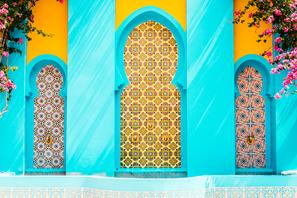Allah (subḥānahū wa taʿālā) says in the Holy Qur’ān,
أَلَا بِذِكْرِ اللهِ تَطْمَئِنُّ الْقُلُوْبُ
“…Truly it is in the remembrance (dhikr) of Allah that hearts find peace” (13:28).
Dhikr (the remembrance of Allah) is one of the best deeds of a believer. It brings life to the heart, filling it with peace and tranquillity. It is the path to knowing Allah, loving Him and being loved by Him. It also protects us from the punishment of Allah. The Messenger of Allah ﷺ said, “There is nothing better a person can do to save himself from Allah’s punishment than to remember Him” (Bayhaqī).
Dhikr purifies and polishes the heart. It softens it and makes it humble. Dhikr is a powerful tool to reduce stress and anxiety. It protects us from illnesses, shayṭān, evil eye and magic. Dhikr increases our awe and fear of Allah. It removes unhealthy fears and gives us courage to live in the way which pleases Him. It helps us live a life of piety and satisfaction. Dhikr is the perfect antidote to loneliness. In a ḥadīth qudsī, Allah says, “I am with My servant when he remembers Me” (Ibn Mājah).
Dhikr is not just limited to human beings. Rather, the entire universe praises and glorifies Allah. Allah (ʿazza wa jall) says, “The seven heavens, the earth, and all those in them glorify Him. There is not a single thing that does not glorify His praises—but you cannot comprehend their glorification. He is indeed Most Forbearing, All-Forgiving” (17:44).
Dhikr wipes away our sins and is the path to unparalleled reward. It cultivates the trees of Paradise, and leads to Allah boasting about us to the Angels. Dhikr gathers around the Throne of Allah, buzzing like bees, mentioning to Allah the person who uttered them. If we want to be successful in this world and the hereafter, we must become people of dhikr. Dhikr will be a nūr (light) in the grave, and on the Day of Judgement. This nūr will keep us steady on the ṣirāṭ (a bridge which must be passed on the Day of Judgement) that will guide us to Paradise, inshāAllah.
“By Allah, the world is only sweet with His remembrance; the Next Life is only sweet with His forgiveness; and Paradise is only sweet with seeing His Noble Face.” – Dhū al-Nūn (raḥimahullāh)
The Best of Those Who Fast
A man asked the Messenger of Allah ﷺ, “Which warriors are the best?” He ﷺ replied: “Those who remember Allah the most.” The man asked, “Which of those who fast are the best?” He ﷺ replied, “Those who remember Allah the most.” Then the man mentioned ṣalāh, zakāh and ḥajj, and each time the Messenger of Allah ﷺ replied, “Those who remember Allah the most.” Abū Bakr (raḍiy Allāhu ʿanhu) said to ʿUmar (raḍiy Allāhu ʿanhu), “Those who remember (Allah) have taken all the good,” at which the Messenger of Allah ﷺ remarked, “Yes, indeed!” (Aḥmad)
The Prophet ﷺ identified the best of those who fast as those who ‘remember Allah the most’. This teaches us to constantly engage in dhikr whilst we are fasting.
The Prophet ﷺ would remember Allah (swt) throughout the entire day. This is reflected in the various adhkār and duʿās which have been authentically narrated from him.
In Ramaḍān, we should fill our days with both of the following types of dhikr:
1) General Dhikr: This is when we remember Allah at any time, as the Messenger of Allah ﷺ used to do. These words can be uttered at any time and in unlimited quantities. This type of dhikr includes the recitation of the Qur’ān, tahlīl, tasbīḥ, taḥmīd, takbīr, ḥawqalah and the Names of Allah. We should constantly remember Allah in this manner throughout the day.
2) Specific Dhikr: These are the supplications (duʿās) and remembrances (adhkār) which are to be said in specific places & times, in specified quantities, and in their specific wordings. These include the adhkār of the morning and evening, before sleep, after ṣalāh, and the adhkār of other actions (e.g. eating, wearing clothes, entering & leaving the house).
We should allocate time in our daily timetable for the above adhkār, especially the morning and evening adhkār. These two times, along with the last third of the night are crucial times for the servant in his journey to Allah. The Messenger of Allah ﷺ said, “Journey to Allah in the morning, the evening and a part of the night…” (Bukhārī). We should aim to make this a habit which spills over to the rest of the months of the year.
“By Allah, if you could hear the sound of the pens of the angels writing your name amongst those who remember Allah, you would die out of joy.” (Ibn al-Qayyim raḥimahullāh)
The Importance of the Sunnah Adhkār
Reading the Sunnah adhkār specifically prescribed by the Prophet ﷺ at the prescribed times in the day is an easy deed, which does not take much time but can transform our lives. By uttering a few yet powerful statements, we can amass unimaginable rewards. We should strive to memorise and understand the meaning of these adhkār. Along with this, we should continuously read their specific virtues to motivate us, and ask Allah (ʿazza wa jall) to grant us these huge rewards.
The precision of wording and the depth of meaning in the sunnah adhkār is unparalleled. The Prophet ﷺ reached the pinnacle of perfection in his servitude of Allah. His knowledge, love, humility and reverence of His Creator was unparalleled. His supplications and remembrances are a reflection of this, and hence comprise of the most perfect formulae for duʿā’ and dhikr.
The Prophet said ﷺ, “The people of Paradise will not regret anything, except for those moments in which they did not remember Allah.” (Ṭabarānī)
Tafakkur: Dhikr with the Presence of the Heart
All of the aforementioned benefits and virtues of dhikr are not attainable, merely by repeating the words on the tongue. Rather, we have to remember Allah with our tongues and hearts. The secret of dhikr is to glorify Allah by reflecting on His Perfect Names, Attributes and Actions and pondering over His blessings and His creation.
To do dhikr consciously, we should reflect on ourselves, and the signs of Allah around us. Reflecting on the beauty, harmony and the vastness of the earth, solar system and the heavens will help us appreciate Allah’s greatness. Going outside in nature and doing dhikr is a powerful means of doing conscious dhikr. [Tip: Perform your morning and evening adhkār outside, especially on days when the skies are clear and you can appreciate the beauty of Allah’s creation.]
Sometimes because we repeat certain phrases of dhikr all the time, we may say it mindlessly. Think of how many times a day we repeat ‘اَللّٰهُ أَكْبَرُ’ (Allah is Greater…!).
How often do we say it with the presence of the heart? Let us always try to think of how great Allah is, and magnify Him with our tongues and our hearts simultaneously.
Ibn al-Jawzī (raḥimahullāh) explains, “The heedless one says سُبْحَانَ الله out of habit. As for the conscious one, he is constantly thinking about the wonders of creation, or the awesome nature of the Creator, and this thinking drives him to say سُبْحَانَ الله. Thus, this tasbīḥ is the fruit of these thoughts, and this is the tasbīḥ of the conscious…
Likewise, they think about the ugliness of past sins, and this leads them to ponder, to have anxiety and to have regret. The fruit of this thought is that they say أَسْتَغْفِرُ الله. This is the true tasbīḥ and istighfār. As for the heedless, they merely utter these out of habit. And what a difference there is between the two types…”
“The best and most beneficial dhikr is when one remembers Allah with the tongue and the heart, it is from the Sunnah adhkār, and one is conscious of its meaning and its purpose.” – Ibn al-Qayyim (raḥimahullāh)
How To Do Dhikr
When doing dhikr, keep in mind the following five etiquettes:
1. Always keep in mind that Allah is with you. In a ḥadīth qudsī, Allah says, “I am with My servant whenever he remembers Me and moves his lips because of Me” (Ibn Mājah).
2. Reflect on the meaning of the dhikr.
3. Reflect on the reward of doing dhikr in general, and the specific reward for specific adhkār.
4. Remember the favours of Allah upon you. For your dhikr to be conscious, your heart has to overflow with gratitude for the One who is the Source of all blessings.
5. Try to be in a calm and quiet place, away from all distractions.
Imām al-Nawawī (raḥimahullāh) writes, “Anyone making dhikr should be in the most perfect state. If he is sitting somewhere, he should face the qiblah with humility and serenity, bowing one’s head. If one remembers Allah in any other state, it is still permissible, without any disapproval; but if there is no excuse for doing so, one would be missing out on something most excellent.”
We should always remember Allah, and we should always thank Him for allowing us to remember Him. lbn al-Kātib (raḥimahullāh) said, “Allah grants the servant the sweetness of His remembrance. If the servant finds joy in it, and thanks Him for it, Allah draws him near to Himself. However, if he falls short in thanking Him, He makes him remember Him with his tongue; but he removes its sweetness from him.”
Muʿādh ibn Jabal (raḍiyallāhu ʿanhu) said, “In my last conversation with the Messenger of Allah ﷺ, I asked him, ‘Which deed is the best and most beloved to Allah?’ He ﷺ replied, **‘That you die whilst your tongue is moist with the remembrance of Allah.’” (Ibn Ḥibbān)
May Allah al-Ḥamīd (The Most Praiseworthy) grant us tongues and hearts which do not cease to praise Him. May He make us of those who honour Him and revere Him with their words and actions.
To make dhikr an essential component of your life, download the Dhikr & Dua app or order a copy of ‘Daily Adhkār’.






